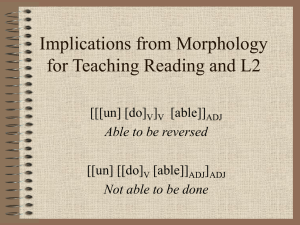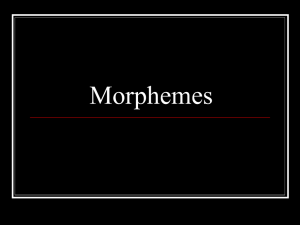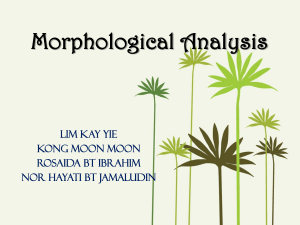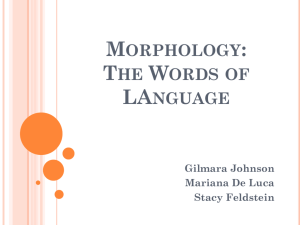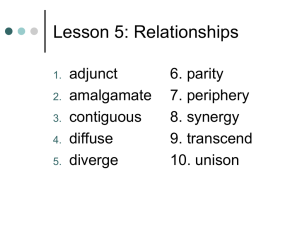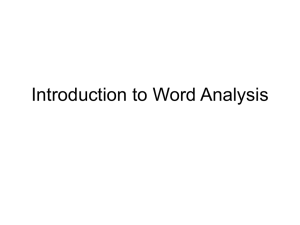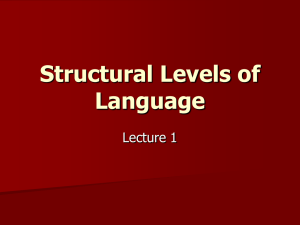Derivational morphemes final draft
advertisement
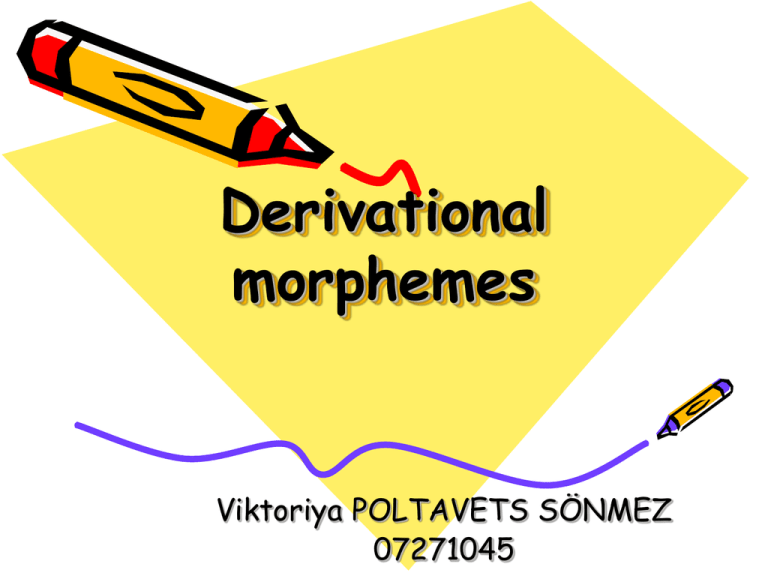
Derivational morphemes Viktoriya POLTAVETS SÖNMEZ 07271045 I. Morphology • Morph (form) + ology (science of) • -- > Morphology (the science of word forms) • The study of the internal structure of words • The rules by which words are formed • Traditionally, the term “morphology” refers to the study of “morphemes”. • But…what’s a morpheme? I. 1. What is morpheme? • Dictionary: • Morpheme • (môr'fēm') • n. • A meaningful linguistic unit consisting of a word, such as man, or a word element, such as -ed in walked, that cannot be divided into smaller meaningful parts. • morphemic mor·phem'ic adj. • morphemically mor·phem'i·cal·ly adv. http://www.answers.com/topic/morpheme • A morpheme is a piece of phonological information that has a conventionalized meaning arbitrarily associated with it. EX: speak (v.) + -er = speaker (n.) The “-er” that changes “speak” to “speaker” is a part of what’s known as the derivational morphology of English. Derivational morphology deals with morphemes that change the lexical category of the word they are added to. Since “-er” changes “speak”, a verb, to “speaker”, a noun, we can say it derives the noun “speaker” from the verb “speak”. I.1.1.Derivational morphemes • Far more numerous than inflectional morphemes • Allow productivity (involved in the coining of new words) • Can be prefixes, or suffixes • Suffixes usually, but not always, change word class • Prefixes, usually don’t • Derivational morphemes derive one word from another. • They have the following properties: • - They affect the meaning of the morpheme that they attach to. • E.g. re- means to redo the process, de- means to undo the process, un- means not…. • - They can change the grammatical category of the word they attach to. • E.g. noun becomes adjective, adjective becomes verb, etc. • - They can be used to create new words, such as debug, reboot, unbirthday, etc. English Affixes (based on the position) Prefix: An affix that occurs before a morpheme Suffix: An affix that occurs after a morpheme It changes the type of meaning of the word. It changes the category and/or the type of meaning of the word, so it is said to create a new word. e.g. suffix –ment in government English Prefixes Examples of Negative Prefixes: unnondisaExamples of size and degree prefixes: mini- suboversuper- English Suffixes Class preserving suffixation: -er lecturer -ian librarian -ist scientist -let piglet Class changing suffixation: Verb Noun perform performance Adjective Adverb nice nicely Adjective Noun active activity Some examples of English Derivational Morpheme • • • • • • -ic -ance -ly -ity -able -ship : Noun Adj : Verb Noun : Adj Adv : Adj Noun : Verb Adj : Noun Noun ; alcohol alcoholic ; clear clearance ; exact exactly ; active activity ; read readable ; friend friendship • re- : Verb Verb ; cover recover • in- : Adj Adj ; definite indefinite How to teach derivation morphemes in the classroom? ACTIVITY 1. Add the prefix un to each word. The prefix un means the opposite. happy lock zip Un + happy = Un + lock = Un + zip = Sixth grade ACTIVITY 2. Add the prefix dis to each word The prefix dis means the opposite. like dis + like = ……………………………………………. agree connect dis + agree =………………………………………. dis + connect = ……………………………. Complete the sentences. Use the negative form of the adjectives in the box. Comfortable,friendly, patient, polite, possible, sensitive, tidy, tolerant. 1 My bedroom is always……………………… . 2 Everyone does things differently – you shouldn’t be ……………………… . 3 It’s ……………………… if you don’t say ‘Thank you’ in English. 4 I bought a new bed because the old one was quite ……………………… . 5 I think it’s ……………………… to get all the answers correct! 6 He laughed at her when she was upset. He’s very ……………………… . 7 Our new neighbours are a bit ……………………… . They didn’t say ‘hello’ this morning. 8 Wait a minute! Don’t be so ……………………… . REFERENCES: • Akkan, Hakan "Turkish EFL Learners' Awareness and Use of English Morphology in Guessing the Meanings of Unknown Words from Context: A Case Study" www.belgeler.com • http://d-scholarship.pitt.edu/8351/ • http://www.scribd.com/doc/61488125/Morpholog y-Problem-Set-Turkish • www.english.web.tr • Yule,G. (2006). The study of language. United Kingdom: Cambridge University Press.
